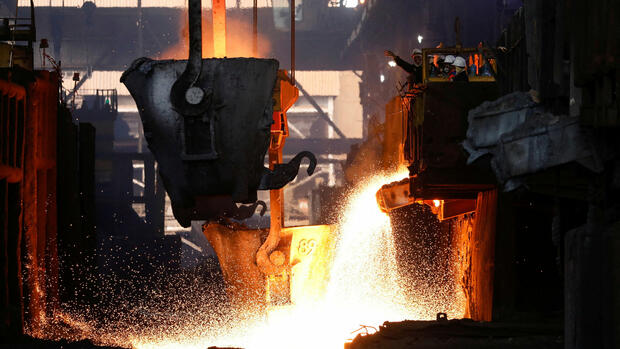Car manufacturers are increasingly securing direct access to important raw materials.
(Photo: Reuters)
Zurich, Dusseldorf Car makers Volkswagen and Stellantis and mining group Glencore are backing finance firm ACG’s purchase of two battery raw material mines in Brazil. This was announced by ACG, a London-listed exchange shell (Spac), on Monday.
ACG plans to buy a nickel sulfide and copper mine from financial investor Appian for $1 billion. Volkswagen subsidiary Powerco will make an upfront payment of $100 million for nickel sulfide. Stellantis, Glencore and a mining investment fund each contribute equally large sums. The remaining funds are to be raised on the capital market.
Nickel is a key component of the most common high-performance electric car battery cells on the market. Copper is also required on a large scale, on the one hand for power cables in electric cars and on the other hand for the charging infrastructure.
The deal underscores the change in strategy of the major car manufacturers in the procurement of raw materials: instead of relying on suppliers and hedging price risks on the financial markets, the groups are increasingly securing access to important raw materials with direct investments in mining companies.
A VW spokesman confirmed that Powerco, into which Volkswagen has bundled its battery business, has signed a long-term offtake agreement for nickel metal in addition to its stake in ACG. It is to be processed into high purity nickel concentrate by Glencore in Canada and Norway. “Powerco is thus securing the ramp-up of cell production at competitive prices,” it said.
Commodities: Market turmoil prompts rethinking
Powerco had already announced in August last year that, like Mercedes-Benz, it wanted to participate in the mining of raw materials in Canada. German car manufacturers had long shied away from the risk of direct investment in mining projects. But unprecedented market distortions in critical battery raw materials have prompted the companies to rethink.
For example, the price of battery-grade lithium carbonate for the Asian market increased tenfold between late 2020 and early 2023, from around $6,000 a ton to over $60,000, according to Bank of America. Lithium is also a key component of electric car batteries.
>> Read also: Up to 90 gigawatt hours and 3000 jobs: Canada will be VW’s largest battery location
The Russian invasion of Ukraine also triggered a run on nickel on the London commodities exchange in March 2022, catapulting the price from less than $20,000 per tonne to over $100,000 within a few days – more than ever before. The stock market almost went under in the chaos. VW had also hedged nickel price increases there at the time.
According to industry estimates, raw material costs account for up to 80 percent of the cost of an electric car battery. With direct investments like ACG, VW, Stellantis and others want to become more independent of such market distortions.
Glencore has long wanted to do business with VW
The deal also underlines the growing importance of metal processing outside of China. It is therefore also a success for Glencore: The Swiss commodity giant is positioning itself as a leading supplier of metals for the energy transition and has been trying for a long time to do business directly with VW. The agreement that has now been reached to process nickel at Glencore’s plants is the first publicly known deal between the two companies.
German car manufacturers have long shied away from the risk of direct investment in mining projects.
(Photo: Bloomberg)
The deal is not without risk: the sale of the two Brazilian mines to the South African company Sibanye-Stillwater had previously failed. Sibanye-Stillwater resigned from the contract in January, citing geotechnical instability at the nickel mine. Owner Appian dismissed this as false and sued the buyer for $1.2 billion. ACG stated that it has full confidence in the mines that can be developed.
Behind the scenes, ACG boss Artem Volynets, an experienced and well-connected Russian-British raw materials manager, is pulling the strings. In 2007, Volynets engineered the merger of the aluminum businesses of Glencore and the two Russian aluminum groups Rusal and Sual. The now-sanctioned Russian oligarchs Oleg Deripaska and Wiktor Wekselberg were involved in the deal.
From 2010 to 2013, Volynets managed Deripaska’s En+ holding. In 2014 he became self-employed and founded ACG as a consulting and investment company.
More: VW boss Blume plans “biggest conversion in decades”
